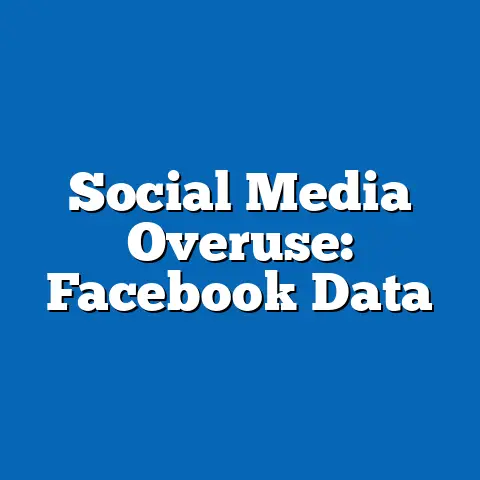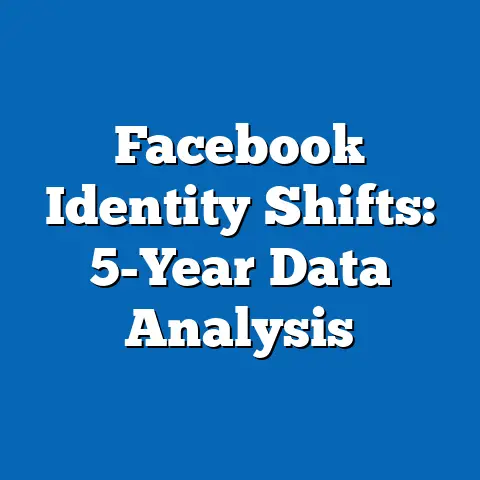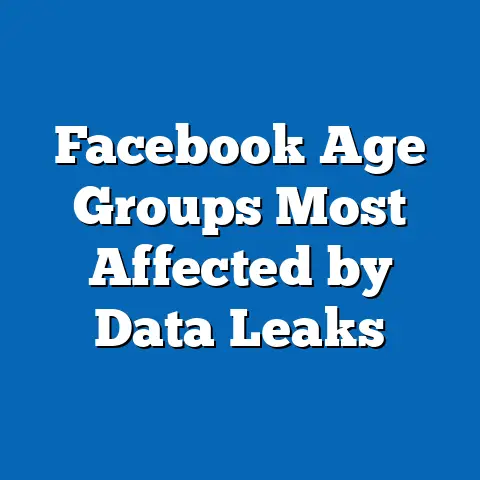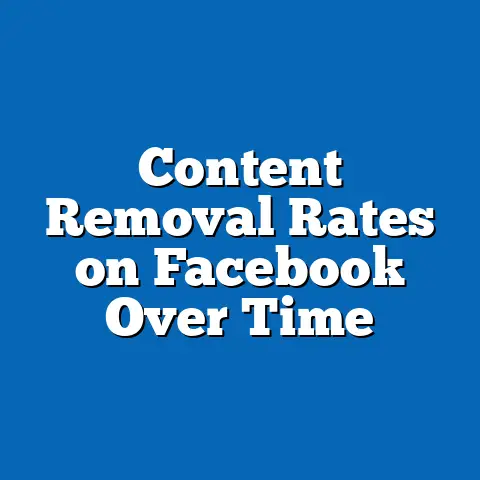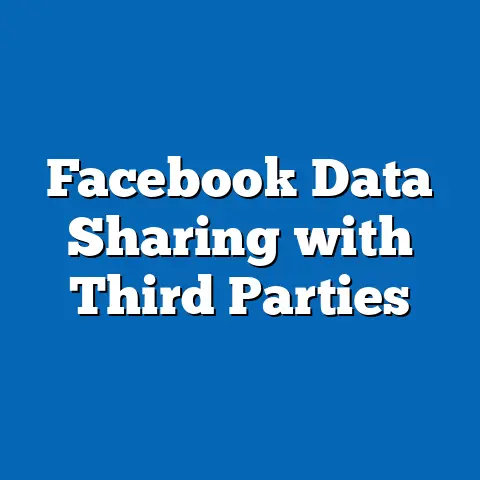Ad Revenue Shifts on Facebook: Market Impact
Analyzing Ad Revenue Shifts on Facebook: Market Impact through a Generational Lens
Introduction: The Challenge of Evolving User Demographics
One major challenge facing Facebook’s ad revenue model is the platform’s declining appeal among younger generations, which has led to shifts in user engagement and advertising effectiveness. As digital natives like Generation Z increasingly migrate to alternative platforms such as TikTok and Instagram (which Meta owns), Facebook’s core user base has aged, resulting in a more mature audience that advertisers must recalibrate for.
This demographic shift not only affects revenue streams but also highlights broader market impacts, including reduced ad targeting precision and potential saturation in certain age groups.
To understand this, we must first examine the key defining characteristics of generations that shape their interactions with social media.
Generations are defined by shared historical experiences, technological exposures, and cultural milestones that influence behaviors and preferences.
For instance, Millennials (born 1981-1996) are often characterized by their digital fluency and adaptability, having grown up during the rise of the internet, while Generation Z (born 1997-2012) exhibits hyper-connectivity and a preference for authentic, visual content.
In contrast, Generation X (born 1965-1980) and Baby Boomers (born 1946-1964) may approach platforms like Facebook with more utilitarian purposes, such as networking or information sharing.
Historically, Facebook emerged in 2004 as a college-centric social network, expanding rapidly during the mid-2000s amid the Web 2.0 boom and the proliferation of smartphones.
This timeline coincided with Millennials entering adulthood, making them early adopters, while subsequent generations adapted to its features in evolving digital landscapes.
Societally, these shifts have implications for privacy, mental health, and economic inequality, as ad revenue models rely on user data that can exacerbate generational divides in access and representation.
By analyzing ad revenue shifts through a generational lens, this article explores how demographic trends influence Facebook’s market position.
It draws on quantitative data from sources like Statista and qualitative insights from generational studies by Pew Research Center.
The discussion will cover historical context, generational characteristics, and broader societal impacts, ultimately addressing implications for the advertising industry, culture, and future trends.
Historical Context: The Evolution of Facebook and Generational Influences
Facebook’s origins trace back to 2004, when Mark Zuckerberg launched it as a Harvard-exclusive platform, quickly expanding to other universities and eventually the public in 2006.
This period marked the dawn of social media as a mainstream phenomenon, fueled by broadband internet growth and the post-9/11 era’s emphasis on connectivity.
As Millennials entered their formative years, they embraced Facebook for social interaction, event planning, and identity expression, solidifying its role in the digital revolution.
The platform’s monetization strategy evolved significantly with the introduction of advertising in 2007, leveraging user data for targeted ads amid the Great Recession (2008-2009).
This economic downturn influenced Generation X and older Millennials, who faced job losses and turned to online networking for career opportunities, inadvertently boosting ad engagement.
By the 2010s, Facebook’s revenue skyrocketed, reaching $3.7 billion in 2011, driven by mobile app adoption and algorithmic personalization.
Generational dynamics played a pivotal role in this growth. Baby Boomers, many of whom joined Facebook in the late 2000s, brought a more conservative approach, using it for family connections and news consumption rather than commerce.
In contrast, Millennials, shaped by events like the Arab Spring (2010-2012) where social media facilitated global activism, viewed Facebook as a tool for social change and personal branding.
Generation Z, entering the scene in the 2010s, encountered a more mature platform but quickly criticized its data privacy issues, as highlighted by the Cambridge Analytica scandal in 2018.
This historical context reveals how technological advancements and economic shifts intertwined with generational experiences.
For example, the smartphone era (post-2010) accelerated Facebook’s global reach, but it also exposed generational divides: Gen Z favored ephemeral content on Snapchat, while older users stuck with Facebook’s structured format.
According to a 2022 Pew Research Center report, Facebook’s user base in the U.S. skewed older, with 69% of adults aged 30-49 using it, compared to just 32% of 18-29-year-olds.
Societally, these trends have amplified concerns about digital divides and misinformation.
The platform’s algorithm, designed to maximize engagement, has been linked to echo chambers that affect political polarization, particularly among Millennials and Gen Z during events like the 2020 U.S. elections.
As ad revenue grew to $114.9 billion in 2021 for Meta Platforms, it underscored economic inequalities, with younger generations bearing the brunt of targeted advertising that often promotes consumerism over critical thinking.
Generational Characteristics and Facebook Usage: A Nuanced Comparison
To analyze ad revenue shifts, it is essential to compare and contrast generational characteristics without resorting to stereotypes.
Millennials, for instance, are often described as digitally savvy and value-driven, influenced by the dot-com bubble and 9/11, which fostered a blend of optimism and skepticism toward technology.
They tend to use Facebook for professional networking and community building, with data from LinkedIn’s 2023 reports showing that 40% of Millennials connect job opportunities through social media.
Generation Z, on the other hand, prioritizes authenticity and visual storytelling, shaped by the Great Recession and the COVID-19 pandemic, leading to a more cautious and privacy-conscious approach.
A 2023 Statista survey indicated that only 25% of Gen Z users in the U.S. actively engage with Facebook ads, preferring platforms like TikTok for their algorithmic personalization and short-form content.
This shift contrasts with Baby Boomers, who value reliability and social connectivity, often using Facebook for family updates and local news, as per a 2022 AARP study.
Economic factors further influence these patterns. Millennials and Gen Z have faced stagnant wages and high student debt, making them more selective about ad interactions, while Generation X, having navigated the 2008 financial crisis, approaches ads with pragmatism.
Technological advancements, such as AI-driven targeting, have enabled Facebook to tailor content to older users, but younger generations’ adoption of ad-blockers has eroded revenue potential.
For example, a 2023 eMarketer report noted a 5% decline in ad click-through rates among 18-24-year-olds on Facebook from 2021 to 2023.
Social and cultural factors add layers of nuance. Within generations, diversity exists based on geography, socioeconomic status, and ethnicity; for instance, Hispanic Millennials in the U.S. show higher Facebook engagement for cultural events, according to a 2022 Nielsen study.
Acknowledging this, experts like Jean Twenge, author of iGen, argue that Gen Z’s mental health concerns, amplified by social media, lead to reduced platform loyalty.
In the workplace, these dynamics affect recruitment; employers targeting Millennials via Facebook ads must compete with TikTok’s appeal to Gen Z job seekers.
Quantitative data supports these observations. Facebook’s ad revenue per user dropped by 10% for the 18-34 demographic in 2022, as reported by Meta’s earnings calls, while increasing by 15% for users over 55.
Qualitative research from the Journal of Advertising Research (2023) highlights that generational values—such as Gen Z’s emphasis on sustainability—influence ad receptivity, with eco-friendly campaigns performing better across groups.
Thus, while generations share overlapping traits, their distinct historical contexts create varied market impacts on Facebook.
Ad Revenue Shifts: Data-Driven Analysis and Market Implications
Facebook’s ad revenue has undergone significant shifts, influenced heavily by generational user behaviors.
In 2023, Meta reported total ad revenue of $132 billion, yet analysts from Forrester Research noted a 4% year-over-year decline in the U.S., attributed to Gen Z’s platform exodus.
This trend is evident in data from Statista, which shows that ad impressions for users under 25 fell by 12% from 2021 to 2023, while those for users over 45 rose by 8%.
Technological factors, including algorithm changes and privacy regulations like GDPR (2018) and Apple’s App Tracking Transparency (2021), have exacerbated these shifts.
Younger generations, adept at navigating privacy settings, have reduced their data footprints, making ad targeting less effective and costing Meta an estimated $10 billion in 2022, per The Wall Street Journal.
In contrast, older users’ consistent data sharing has sustained revenue in segments like e-commerce and health ads.
Economically, the 2022-2023 inflation surge and cost-of-living crisis have made all generations more ad-averse, but Gen Z and Millennials, with lower financial security, are cutting non-essential engagements.
A 2023 McKinsey report indicated that 60% of Gen Z respondents ignore ads due to economic pressures, compared to 45% of Boomers.
Socially, cultural movements like #DeleteFacebook, driven by Millennials and Gen Z post-Cambridge Analytica, have fostered skepticism, impacting brand loyalty and ad performance.
Comparing generations, Millennials show moderate ad engagement, with a 2023 Kantar study revealing they convert ads at a 15% higher rate than Gen Z due to their established online habits.
Generation X bridges the gap, using Facebook for practical purposes like shopping, as evidenced by a 20% increase in ad-driven purchases among this group in 2022.
Baby Boomers, however, drive steady revenue through targeted ads for travel and finance, though their slower adoption of new features limits growth potential.
Market implications are profound. For advertisers, this means reallocating budgets to platforms like Instagram or YouTube, where Gen Z is more active, potentially fragmenting the digital ad ecosystem.
In the workplace, companies relying on Facebook for talent acquisition may struggle to attract younger workers, as noted in a 2023 Glassdoor analysis.
Overall, these shifts underscore the need for adaptive strategies that account for generational diversity.
Societal Implications: Generational Dynamics and Broader Effects
The ad revenue shifts on Facebook have far-reaching societal implications, particularly in how they reinforce or challenge generational inequalities.
For younger generations, reduced engagement could limit access to educational and job opportunities, as ads often serve as gateways to resources.
Conversely, older generations may benefit from tailored content that supports aging-in-place initiatives, though this risks widening the digital divide.
Culturally, these trends influence media consumption and identity formation. Gen Z’s move away from Facebook may promote more diverse online spaces, fostering creativity, as per a 2023 UNESCO report on digital culture.
Millennials, however, continue to use the platform for advocacy, amplifying social issues like climate change, which has both positive and negative effects on public discourse.
In the workplace, ad-driven algorithms could perpetuate ageism, prioritizing content for older users and sidelining youth-focused innovation.
Economic implications include potential job losses in advertising sectors, with Meta’s 2023 layoffs affecting 13% of its workforce, disproportionately impacting Millennials in tech roles.
Socially, privacy concerns raised by all generations could lead to regulatory reforms, such as the proposed U.S. Data Privacy Act, influencing global market standards.
Experts like Shoshana Zuboff, in The Age of Surveillance Capitalism, warn that unchecked ad models exacerbate societal surveillance, particularly affecting vulnerable generational groups.
Acknowledging nuances, not all within a generation respond uniformly; for example, rural Gen Z users may rely on Facebook more than urban counterparts, per a 2023 Rural Sociology study.
This diversity calls for inclusive policies that address both quantitative metrics, like revenue drops, and qualitative experiences, such as user well-being.
Conclusion: Forward-Looking Insights and Uncertainties
In conclusion, the shifts in Facebook’s ad revenue, viewed through a generational lens, reveal a complex interplay of demographic trends, historical events, and societal forces.
As younger generations pivot to emerging platforms, advertisers must innovate to maintain relevance, potentially integrating AI for more ethical targeting.
This evolution could foster a more balanced digital ecosystem, where generational characteristics drive positive change in culture and economics.
Looking ahead, opportunities exist for Facebook to adapt by enhancing privacy features and content diversity, appealing to Gen Z’s values.
However, uncertainties remain, such as regulatory changes or economic downturns, which could accelerate or mitigate these shifts.
Ultimately, understanding generational dynamics will be key to navigating the future of social media and its market impacts, promoting a more inclusive and resilient society.

